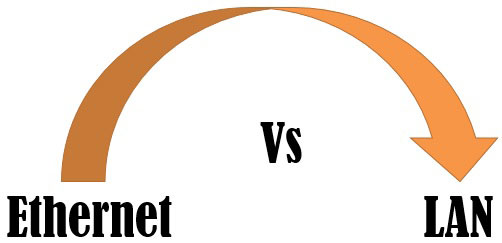Difference between Ethernet and LAN
In another context, Ethernet is also a protocol that helps to connect networks and communicate between nodes in different networks (LAN, MAN, WAN, .).
Ethernet
Ethernet is a network standard that defines no computers or central devices on the network (nodes) that need to be controlled when data is transmitted. That is, each node tries to transmit data as it determines the network can receive communications. If two computers on an Ethernet network try to send data at the same time, a collision will occur and the computers have to resend the message.
 Ethernet is based on a bus topology
Ethernet is based on a bus topology
Ethernet is based on a bus topology, but Ethernet networks can be wired in a star pattern. The Ethernet standard defines instructions for the physical configuration of the network, for example, cabling systems, network cards and nodes. Today, Ethernet is the most popular LAN standard because it is relatively inexpensive, easy to install and maintain. Ethernet networks often use cables to transmit data.
LAN
A local area network (LAN) is a network that connects computers and equipment in a limited geographic area, such as a home, a school computer lab, an office building, or a group of buildings with a location. adjacent. Each computer or device on the network, called a node, usually shares resources such as printers, large capacity hard drives, and programs. Usually, nodes are connected via cables.
 LAN is controlled centrally
LAN is controlled centrally
Wireless LAN (WLAN) is a LAN that does not use physical cables. Typically, a WLAN communicates with a wired LAN to access its resources.
Main difference between Ethernet and LAN
1. Ethernet is the basic technology to establish a network, while LAN is a larger private network than Ethernet in terms of scale and reliability.
2. The topology used in Ethernet are bus and star (star), while in LAN, topology can be bus, ring (circle), star (star). , mesh (mesh), etc.
3. LAN is controlled centrally, while Ethernet does not need to be centralized.
4. In Ethernet, data transmission is performed only when the path is not occupied. In contrast, LANs don't have any limitations like Ethernet.
5. LAN can be wired and wireless. In contrast, Ethernet can only be wired.
 Ethernet and LAN are closely related
Ethernet and LAN are closely related
Conclude
Ethernet is an open standard for network management, it is also considered the main set of standards for the physical features of LANs. Another way to differentiate LAN from Ethernet is network size, transmission technology and topology, in which LANs can be scaled up at a high level and Ethernet networks are smaller in scale.